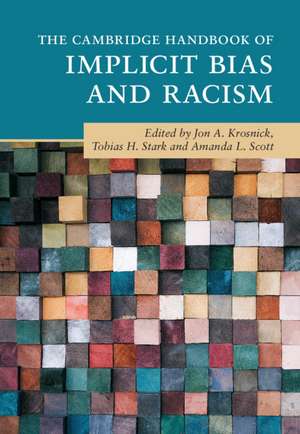The Cambridge Handbook of Implicit Bias and Racism: Cambridge Handbooks in Psychology
Editat de Jon A. Krosnick, Tobias H. Stark, Amanda L. Scotten Limba Engleză Paperback – 29 sep 2023
| Toate formatele și edițiile | Preț | Express |
|---|---|---|
| Paperback (1) | 398.52 lei 6-8 săpt. | |
| Cambridge University Press – 29 sep 2023 | 398.52 lei 6-8 săpt. | |
| Hardback (1) | 1105.19 lei 6-8 săpt. | |
| Cambridge University Press – 29 sep 2023 | 1105.19 lei 6-8 săpt. |
Din seria Cambridge Handbooks in Psychology
- 23%
 Preț: 1254.71 lei
Preț: 1254.71 lei - 11%
 Preț: 449.49 lei
Preț: 449.49 lei -
 Preț: 502.52 lei
Preț: 502.52 lei -
 Preț: 501.96 lei
Preț: 501.96 lei - 8%
 Preț: 426.60 lei
Preț: 426.60 lei -
 Preț: 486.56 lei
Preț: 486.56 lei - 5%
 Preț: 441.42 lei
Preț: 441.42 lei - 9%
 Preț: 1282.42 lei
Preț: 1282.42 lei -
 Preț: 494.25 lei
Preț: 494.25 lei - 8%
 Preț: 429.69 lei
Preț: 429.69 lei - 5%
 Preț: 397.85 lei
Preț: 397.85 lei - 23%
 Preț: 1246.12 lei
Preț: 1246.12 lei - 5%
 Preț: 439.60 lei
Preț: 439.60 lei - 19%
 Preț: 496.97 lei
Preț: 496.97 lei - 5%
 Preț: 718.47 lei
Preț: 718.47 lei -
 Preț: 511.59 lei
Preț: 511.59 lei - 8%
 Preț: 426.60 lei
Preț: 426.60 lei - 8%
 Preț: 427.05 lei
Preț: 427.05 lei - 8%
 Preț: 425.42 lei
Preț: 425.42 lei -
 Preț: 411.90 lei
Preț: 411.90 lei -
 Preț: 272.34 lei
Preț: 272.34 lei - 8%
 Preț: 425.42 lei
Preț: 425.42 lei - 9%
 Preț: 594.27 lei
Preț: 594.27 lei -
 Preț: 511.21 lei
Preț: 511.21 lei - 23%
 Preț: 1248.79 lei
Preț: 1248.79 lei -
 Preț: 370.88 lei
Preț: 370.88 lei - 8%
 Preț: 424.41 lei
Preț: 424.41 lei -
 Preț: 374.90 lei
Preț: 374.90 lei - 8%
 Preț: 427.49 lei
Preț: 427.49 lei -
 Preț: 511.59 lei
Preț: 511.59 lei - 5%
 Preț: 1538.86 lei
Preț: 1538.86 lei - 23%
 Preț: 2195.06 lei
Preț: 2195.06 lei - 8%
 Preț: 489.88 lei
Preț: 489.88 lei - 8%
 Preț: 428.36 lei
Preț: 428.36 lei -
 Preț: 488.47 lei
Preț: 488.47 lei - 9%
 Preț: 850.10 lei
Preț: 850.10 lei - 8%
 Preț: 430.05 lei
Preț: 430.05 lei -
 Preț: 497.35 lei
Preț: 497.35 lei -
 Preț: 283.03 lei
Preț: 283.03 lei
Preț: 398.52 lei
Preț vechi: 433.17 lei
-8% Nou
Puncte Express: 598
Preț estimativ în valută:
76.26€ • 79.17$ • 63.59£
76.26€ • 79.17$ • 63.59£
Carte tipărită la comandă
Livrare economică 24 martie-07 aprilie
Preluare comenzi: 021 569.72.76
Specificații
ISBN-13: 9781108794435
ISBN-10: 1108794432
Pagini: 500
Dimensiuni: 170 x 244 x 45 mm
Greutate: 1.28 kg
Editura: Cambridge University Press
Colecția Cambridge University Press
Seria Cambridge Handbooks in Psychology
Locul publicării:Cambridge, United Kingdom
ISBN-10: 1108794432
Pagini: 500
Dimensiuni: 170 x 244 x 45 mm
Greutate: 1.28 kg
Editura: Cambridge University Press
Colecția Cambridge University Press
Seria Cambridge Handbooks in Psychology
Locul publicării:Cambridge, United Kingdom
Cuprins
Foreword; Introduction: taking stock of explicit and implicit prejudice; 1. Report on the NSF conference on implicit bias; Section 1. What is implicit bias and (how) can we measure it?: 2. Implicit bias: what is it?; 3. Lessons from two decades of project implicit; 4. Aversive racism and implicit bias; 5. Stretching the limits of science: was the implicit-racism debate a 'bridge too far' for social psychology?; Section 2. Predicting behavior and attitudes with measures of implicit bias: 6. The impact of implicit racial bias in racial health disparities: a practical problem with theoretical implications; 7. Revisiting the measurement of group schemas in political science; 8. Implicit bias and discrimination: evidence on causality; 9. What is the unique contribution of implicit measures in predicting political choices?; 10. Predicting biased behavior with implicit attitudes: results from a voting experiment and the 2008 Presidential election; Section 3. Challenges of research on implicit Bias: 11. The rationality, interpretation and overselling of tests of implicit cognition; 12. Listening to measurement error: lessons from the IAT; 13. IAT Scores, racial gaps, and scientific gaps; 14. Commentary; Section 4. Improving measurement and theorizing about implicit bias: 15. Methodological issues in the study of implicit attitudes; 16: The bias of crowds: rethinking implicit bias in social context; 17. Latent state-trait analyses for process models of implicit measures; 18. Increasing the validity of implicit measures: new solutions for assessment, conceptualization, and action explanation; 19. A model of moderated convergence between explicit dispositions, implicit dispositions, and behavior; 20: Complications in predicting intergroup behavior from implicit biases: one size does not fit all; Section 5. How to change implicit bias?: 21. Changing implicit bias vs empowering people to address the personal dilemma of unintentional bias; 22. How can we change implicit bias toward outgroups?; Section 6. Explicit prejudice, alive and well?: 23. A survey researcher's response to the implicit revolution: listen to what people say; 24. A history of the new racisms: symbolic racism, modern racism, and racial resentment; 25. The relations among explicit prejudice measures: anti-black affect and perceptions of value violation as predictors of symbolic racism and attitudes toward racial policies; 26. Complexities in the measurement of explicit racial attitudes; 27. The continuing relevance of Whites' explicit bias—and reflections on the tools to measure it; Section 7. The public's (mis)perception of implicit bias: 28. Public attitudes on implicit bias; 29. The mass public's view of implicit bias, with implications for scientific communication in a politically polarized age.
Descriere
A summary of the current state of implicit bias research, documenting what is known and what needs further study.
